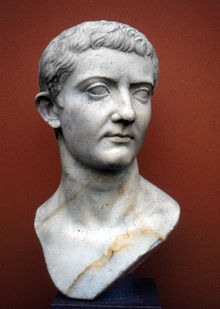
Back Tiberius Afrikaans Tiberius ALS Tiberio AN تيبيريوس Arabic تيبيريوس ARZ Tiberiu AST Tiberi Azerbaijani تیبریوس AZB Тыберый Byelorussian Тыбэрыюс BE-X-OLD
| Tiberius | |||||
|---|---|---|---|---|---|
| Emperor of the Roman Empire | |||||
 A bust of the Emperor Tiberius | |||||
| Reign | 14–37 AD | ||||
| Predecessor | Augustus | ||||
| Successor | Caligula | ||||
| Born | November 16, 42 BC Rome | ||||
| Died | March 16, AD 37 (aged 77) Misenum | ||||
| Spouse | 1) Vipsania Agrippina, 20 to 12 BC 2) Julia the Elder, 11 to 2 BC | ||||
| Issue | By Julia: one child, daughter (?) (died in infancy); Germanicus (adoptive) | ||||
| |||||
| Imperial Dynasty | Julio-Claudian | ||||
| Father | Tiberius Claudius Nero | ||||
| Mother | Livia Drusilla | ||||
Tiberius (Tiberius Julius Caesar Augustus, 16 November 42 BC – 16 March 37 AD) was the second Roman Emperor. He ruled from 14 CE to 37 CE.[1] He was the step-son of Caesar Augustus.
Tiberius was one of Ancient Rome's greatest generals, whose campaigns protected the northern frontier. He reigned for 22 years, and the first part of his imperial work was excellent. Later, he came to be remembered as a dark, reclusive, and somber ruler. After the death of his son Drusus in 23, the quality of his rule declined and ended in terror.
In 26, Tiberius moved from Rome to the Isle of Capri, and left administration largely in the hands of his unscrupulous Praetorian Prefect Sejanus. Sejanus became the effective ruler of Rome, and plotted against Tiberius, murdering people who opposed him. When alerted, Tiberius counter-plotted to remove Sejanus from his official positions, and eventually executed him. More executions followed of people who had committed crimes under Sejanus' rule.
Caligula, Tiberius' grand-nephew and adopted grandson, succeeded the Emperor upon his death.
- ↑ Robinson Jr., C.A. (May 1964). "Introduction". Selections from Greek and Roman historians. Holt, Rinehart and Winston. pp. xxix.